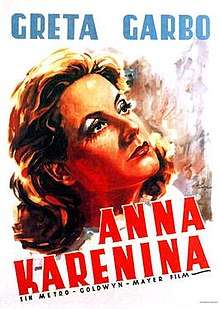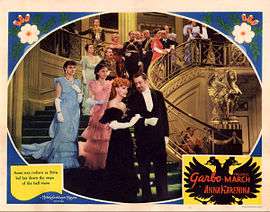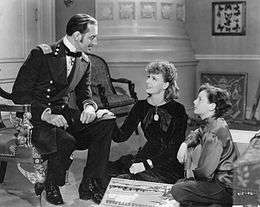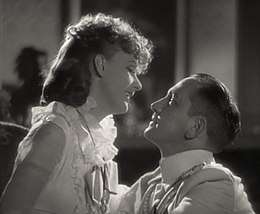Anna Karenina (1935 film)
Anna Karenina is a 1935 Metro-Goldwyn-Mayer film adaptation of the 1877 novel Anna Karenina by Leo Tolstoy and directed by Clarence Brown. The film stars Greta Garbo, Fredric March, Basil Rathbone and Maureen O'Sullivan. There are several other film adaptations of the novel.
| Anna Karenina | |
|---|---|
 1935 German Theatrical Poster | |
| Directed by | Clarence Brown |
| Produced by | David O. Selznick |
| Written by | S.N. Behrman Clemence Dane Salka Viertel Leo Tolstoy (novel) |
| Starring | Greta Garbo Fredric March Maureen O'Sullivan Freddie Bartholomew Basil Rathbone Reginald Owen |
| Music by | Herbert Stothart |
| Cinematography | William H. Daniels |
| Edited by | Robert Kern |
| Distributed by | Metro-Goldwyn-Mayer |
Release date |
|
Running time | 95 minutes |
| Country | United States |
| Language | English |
In New York, the film opened at the Capitol Theatre, the site of many prestigious MGM premieres. The film earned $2,304,000 at the box office, and won the Mussolini Cup for best foreign film at the Venice Film Festival. Greta Garbo received a New York Film Critics Circle Award for Best Actress for her role as Anna. In addition, the film was ranked #42 on the American Film Institute's list of AFI's 100 Years...100 Passions.
Plot
Anna Karenina (Greta Garbo) is the wife of Czarist official Karenin (Basil Rathbone). While she tries to persuade her brother Stiva (Reginald Owen) from a life of debauchery, she becomes infatuated with dashing military officer Count Vronsky (Fredric March). This indiscreet liaison ruins her marriage and position in 19th century Russian society; she is even prohibited from seeing her own son Sergei (Freddie Bartholomew), with eventual dire results.[2]
Cast
- Greta Garbo as Anna Karenina
- Fredric March as Count Vronsky
- Freddie Bartholomew as Sergei
- Maureen O'Sullivan as Kitty
- May Robson as Countess Vronsky
- Basil Rathbone as Karenin
- Reginald Owen as Stiva
- Phoebe Foster as Dolly
- Reginald Denny as Yashvin
- Gyles Isham as Levin
- Joan Marsh as Lili
- Ethel Griffies as Mme. Kartasov
- Harry Beresford as Matve
- Cora Sue Collins as Tania
- Mary Forbes as Princess Sorokina
- Harry Allen as Cord
- Mischa Auer as Mahotin
- Sarah Padden as Governess
- Harry Cording as Officer (uncredited)
- Olaf Hytten as Butler (uncredited)
Production


Reception
Writing for The Spectator in 1935, Graham Greene made much of Greta Garbo's powerful and theatrical acting in the film, noting that "it is Greta Garbo's personality which 'makes' this film, which fills the mould of the neat respectful adaptation with some kind of sense of the greatness of the novel". Greene found that the pathos that Garbo's acting brings to the picture overwhelms the acting of all supporting cast save that of Basil Rathbone.[3]
The film is recognized by American Film Institute in these lists:
- 2002: AFI's 100 Years...100 Passions – #42[4]
Notes
Garbo also was the lead in the 1927 version of Anna Karenina, released under the title Love.
References
- Brown, Gene (1995). Movie Time: A Chronology of Hollywood and the Movie Industry from Its Beginnings to the Present. New York: Macmillan. p. 124. ISBN 0-02-860429-6.
- Anna Karenina Archived November 19, 2009, at the Wayback Machine, allmovie.com
- Greene, Graham (11 October 1935). "Anna Karenina/The Informer". The Spectator. (reprinted in: Taylor, John Russell, ed. (1980). The Pleasure Dome. pp. 25–27. ISBN 0192812866.)
- "AFI's 100 Years...100 Passions" (PDF). American Film Institute. Retrieved 2016-08-18.
External links
| Wikimedia Commons has media related to Anna Karenina (1935 film). |
